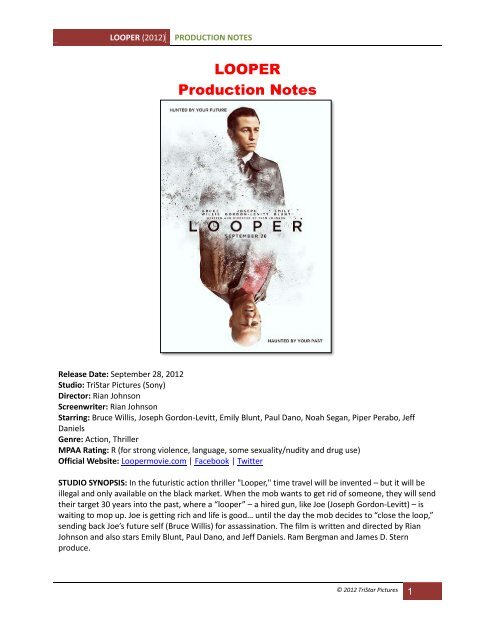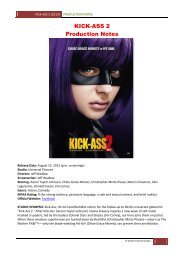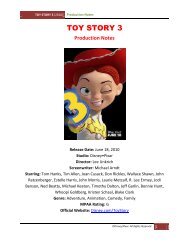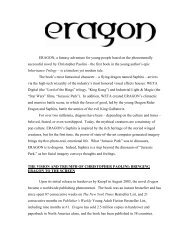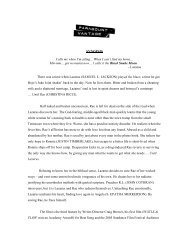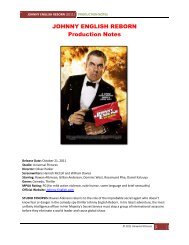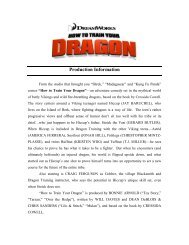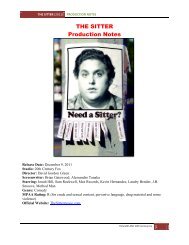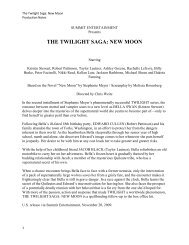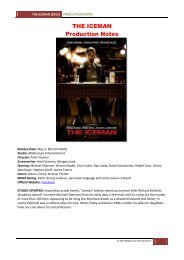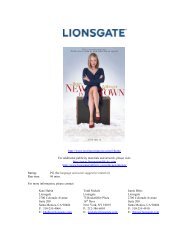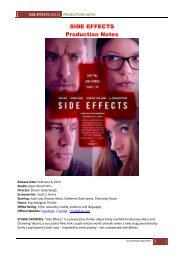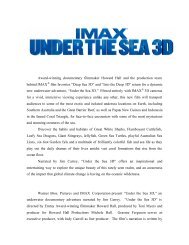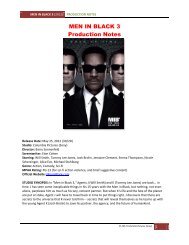LOOPER Production Notes - Visual Hollywood
LOOPER Production Notes - Visual Hollywood
LOOPER Production Notes - Visual Hollywood
You also want an ePaper? Increase the reach of your titles
YUMPU automatically turns print PDFs into web optimized ePapers that Google loves.
<strong>LOOPER</strong> (2012)<br />
PRODUCTION NOTES<br />
<strong>LOOPER</strong><br />
<strong>Production</strong> <strong>Notes</strong><br />
Release Date: September 28, 2012<br />
Studio: TriStar Pictures (Sony)<br />
Director: Rian Johnson<br />
Screenwriter: Rian Johnson<br />
Starring: Bruce Willis, Joseph Gordon-Levitt, Emily Blunt, Paul Dano, Noah Segan, Piper Perabo, Jeff<br />
Daniels<br />
Genre: Action, Thriller<br />
MPAA Rating: R (for strong violence, language, some sexuality/nudity and drug use)<br />
Official Website: Loopermovie.com | Facebook | Twitter<br />
STUDIO SYNOPSIS: In the futuristic action thriller "Looper," time travel will be invented – but it will be<br />
illegal and only available on the black market. When the mob wants to get rid of someone, they will send<br />
their target 30 years into the past, where a “looper” – a hired gun, like Joe (Joseph Gordon-Levitt) – is<br />
waiting to mop up. Joe is getting rich and life is good… until the day the mob decides to “close the loop,”<br />
sending back Joe’s future self (Bruce Willis) for assassination. The film is written and directed by Rian<br />
Johnson and also stars Emily Blunt, Paul Dano, and Jeff Daniels. Ram Bergman and James D. Stern<br />
produce.<br />
© 2012 TriStar Pictures<br />
1
<strong>LOOPER</strong> (2012)<br />
PRODUCTION NOTES<br />
<strong>Production</strong> Information<br />
In the futuristic action thriller Looper, time travel will be invented – but it will be illegal and<br />
only available on the black market. When the mob wants to get rid of someone, they will send<br />
their target 30 years into the past, where a “looper” – a hired gun, like Joe (Joseph Gordon-<br />
Levitt) – is waiting to mop up. Joe is getting rich and life is good… until the day the mob<br />
decides to “close the loop,” sending back Joe’s future self (Bruce Willis) for assassination. The<br />
film is written and directed by Rian Johnson and also stars Emily Blunt, Paul Dano, and Jeff<br />
Daniels. Ram Bergman and James D. Stern produce.<br />
TriStar Pictures, FilmDistrict, and Endgame Entertainment present in association with DMG<br />
Entertainment a Ram Bergman production, a film by Rian Johnson, Looper. The film stars<br />
Bruce Willis, Joseph Gordon-Levitt, Emily Blunt, Paul Dano, Noah Segan, Piper Perabo, and<br />
Jeff Daniels. Written and Directed by Rian Johnson. Produced by Ram Bergman and James D.<br />
Stern. Executive Producers are Douglas E. Hansen, Julie Goldstein, Peter Schlessel, Joseph<br />
Gordon-Levitt and Dan Mintz. Co-Producers are Dave Pomier, Eleanor Nett, Lucas Smith, and<br />
Christopher C. Chen. Director of Photography is Steve Yedlin. <strong>Production</strong> Designer is Ed<br />
Verreaux. Film Editor is Bob Ducsay. Costume Designer is Sharen Davis. Music by Nathan<br />
Johnson. Casting by Mary Vernieu, CSA.<br />
Looper has been rated R by the Motion Picture Association of America for strong violence,<br />
language, some sexuality/nudity and drug content. The film will be released in theaters<br />
nationwide on September 28, 2012.<br />
© 2012 TriStar Pictures<br />
2
<strong>LOOPER</strong> (2012)<br />
PRODUCTION NOTES<br />
ABOUT THE FILM<br />
A hit man named Joe (Joseph Gordon-Levitt) discovers that his next target is his future self<br />
(Bruce Willis) in Looper, a mind-bending and time-bending thriller from writer-director Rian<br />
Johnson. The film takes place in 2044, when time travel doesn’t exist yet – but thirty years down<br />
the line, it will, and it will be controlled by gangsters for one purpose. As Gordon-Levitt<br />
explains, “The gangsters use time travel to kill people – they zap their victim back to the past,<br />
where a hit man called a Looper, employed by the future gangsters, assassinates them and<br />
disposes of the body.”<br />
The trouble for Joe comes when he “lets his loop run,” says Willis. “Letting your loop run<br />
means that you’ve shown up to work, your older self has appeared in front of you, and – for<br />
whatever reason – you’ve let your older self escape. It doesn’t happen often, because if all goes<br />
correctly, your older self should have a sack over his head and be gagged and tied. You should<br />
just shoot him without knowing what you’re doing. But my character shows up in front of his<br />
younger self untied and no sack over his head. I get the drop on him and escape.”<br />
Looper re-teams Gordon-Levitt with Johnson, who have remained good friends since filming the<br />
independent hit Brick some years ago. “Rian and I first met nearly ten years ago,” says Gordon-<br />
Levitt. “It wasn’t too long after we shot Brick that he started telling me about his idea for<br />
Looper, He ended up writing the lead character for me, which is the first time that’s ever<br />
happened to me as an actor, so to play that was a great honor.”<br />
“When Joe and I first spoke about Looper, just after we made Brick, it was just the premise of<br />
the movie,” says the writer-director. “What I liked about the idea was the predicament that Joe<br />
finds himself in – he knows what the future holds, and he has to make a moral choice about<br />
which way it’s going to go.”<br />
Willis’s character is motivated by just how bad things have gone in the future. If the 2040s are a<br />
future where things are run down and everything has gone slightly wrong, the 2070s are marked<br />
by the change in control of the organized crime syndicates. “Everything is under the control of a<br />
© 2012 TriStar Pictures<br />
3
<strong>LOOPER</strong> (2012)<br />
PRODUCTION NOTES<br />
guy called The Rainmaker,” says Willis. “He’s orchestrating mass executions – a reign of terror.<br />
But my character knows where the Rainmaker lives in Young Joe’s time. When I go back in<br />
time, I go on a mission to track down the Rainmaker and fix the future. Of course, nothing is as<br />
easy or as simple as it seems.”<br />
Producer Ram Bergman – who previously produced Johnson’s first two films, Brick and The<br />
Brothers Bloom – says that working with a writer-director like Johnson is a rare treat. “He’s just<br />
so talented, unique, and nice,” says Bergman. “The dynamic is that Rian tells me an idea and<br />
then he goes and develops it. We go back and forth on a few drafts, and when we feel like the<br />
draft is ready to go, we figure out how to make the movie – and to make it in a way that Rian can<br />
do it the way he wants to do it. It’s our job to support his vision and help him make it a reality.”<br />
Producer James D. Stern also re-teams with Johnson, after joining with Bergman to produce<br />
Johnson’s The Brothers Bloom. “Rian is a singular voice. That’s what makes him so special. He<br />
always maintains a unique take on the world he’s creating and doesn’t sacrifice what he wants to<br />
accomplish,” says producer James D. Stern. “People know the real thing when they see it, and<br />
that conversation between artist and audience is critical. When I first read Looper, I was not only<br />
eager about the prospect of working with Rian again (as well as Ram), but also thrilled to jump<br />
into a film that not only has so many twists and turns, but also is so rich with layers and<br />
meaning.”<br />
In creating the time-travel story, Johnson kept things simple. “You get put into the machine in<br />
the 2070s and you get sent back – bang! – thirty years to a predetermined site,” he explains.<br />
“The time machine is set at a fixed interval – you can’t dial it up or down,” says Johnson. “So as<br />
time keeps going forward in 2074, the point a person is going to be sent back to the 2040s keeps<br />
sliding forward as well.”<br />
Johnson also set up a world in which time travel has been outlawed, so it isn’t necessarily fully<br />
understood or researched – the only thing the mobsters know is that it works. In fact, “The<br />
smartest men in the future know one thing: they know to be scared to death of it,” says Johnson.<br />
“That’s part of the reason it was outlawed – grandfather paradoxes, butterfly effects… nobody<br />
© 2012 TriStar Pictures<br />
4
<strong>LOOPER</strong> (2012)<br />
PRODUCTION NOTES<br />
really knows what would happen. All they know is that it’s incredibly dangerous and they<br />
shouldn’t be messing with it, and even the mob will only mess with it in this one particular way.<br />
That’s one of the reasons why it’s so important that loops sent to be closed get closed: this person<br />
from the future is now loose. Who knows what the consequences could be.”<br />
“The movie was completely in Rian’s head,” says Stern. “He knows exactly how he wants to cut<br />
the film, how he wants the film to look. He knows every shot, every day. When I came to New<br />
Orleans, where we shot the movie, every single person in the production office had a book with<br />
all the storyboards. Every single person knew every single shot in the movie. It was amazing,<br />
and it’s a real tribute to Rian.”<br />
At the center of the film are the Loopers – the low-level hit men assigned to rub out the victims<br />
of the future mob. “Loopers are not the most forward-thinking guys,” says Gordon-Levitt.<br />
“Your victim appears out of nowhere, hogtied, and you just have to shoot him. All it takes is the<br />
willingness to risk your life, because eventually, the future gangsters will ‘close your loop’ and<br />
send your future self to be your next victim.<br />
The Loopers’ weapon of choice is the Blunderbuss. “It’s designed for what a Looper does,<br />
which is to shoot a hogtied man from ten feet away,” says Gordon-Levitt. “It doesn’t have any<br />
range or accuracy – you can’t hit anything far away, but you also can’t miss anything if it’s<br />
close.”<br />
“The Blunderbuss is an awful gun,” says Johnson. “It’s basically a metal tube that can cough out<br />
a couple of shots. But if a guy shows up in front of you, hogtied, with a sack over his head, and<br />
you’ve got to kill him, it’s the gun that’s made for the job.”<br />
“The Loopers aren’t really good killers – they’re more like technicians,” says Paul Dano, who<br />
plays one of Joe’s fellow Loopers. “The mob has made it as simple as possible – like working in<br />
a factory line where all you do is pull a lever.”<br />
Compare these low-level gangsters with the more talented Gat Men – trained killers with better<br />
© 2012 TriStar Pictures<br />
5
<strong>LOOPER</strong> (2012)<br />
PRODUCTION NOTES<br />
weapons to show for it. “Gat men are the muscle for the main mob in the present day,” says<br />
Johnson. “If the Loopers are the low men on the totem pole, the gat men are the real muscle that<br />
run the city. Gat men have these huge, very accurate revolvers – precision weapons. They’re<br />
very easy to clear if they jam – they’re big, imposing guns that you do not want to mess with.”<br />
CASTING THE FILM<br />
In the film, Joe, played by Joseph Gordon-Levitt, is a “looper” – a hit man for the mob. When<br />
future gangsters want to rub somebody out, they send the target back in time, where Joe is<br />
waiting to do him in. After all, what better place to hide a body than in the past It’s all a big<br />
party for Joe until the day comes when the mob decides to “close his loop” – that is, send his<br />
future self back for assassination.<br />
Meanwhile, in 2074, Old Joe (Bruce Willis) has seen the years and the mileage. But when the<br />
new gangsters in town try to “close his loop,” he will take matters into his own hands. He gives<br />
his younger self the slip – that is, Young Joe “lets his loop run” – and now, Old Joe is on the run<br />
from his past self and trying to change his future.<br />
As the movie calls for an older and a younger version of the same character, there was an<br />
interesting casting challenge for the filmmakers. Rather than seek out two actors who naturally<br />
look alike, they instead sought out the best actors for the roles – and let the chips fall where they<br />
may. “I had written the younger part for Joseph Gordon-Levitt, who, besides being my favorite<br />
actor, is also a good friend and we wanted to work with each other again,” says Johnson. “When<br />
the possibility of Bruce Willis to play the older Joe presented itself, I got so excited because<br />
Bruce is such a good actor and was so right for the part in so many ways. It raised a problem,<br />
though, because they really look nothing like each other. We had to find a way to bridge the gap,<br />
and the solution was two-fold.<br />
“The first thing was makeup,” Johnson continues. “Joseph Gordon-Levitt went through nearly<br />
three hours of makeup and prosthetics every single morning to adjust his nose, his upper lip and<br />
© 2012 TriStar Pictures<br />
6
<strong>LOOPER</strong> (2012)<br />
PRODUCTION NOTES<br />
his lower lip. There was no way we were going to make him look like a young Bruce Willis, but<br />
we decided we’d pick a couple of key features and alter them just enough to give the audience<br />
something to grab onto so they could decide to go with it.”<br />
“I had the pleasure of working with Kazuhiro Tsuji, who is arguably the best special effects<br />
makeup designer in the world,” says Gordon-Levitt. “He’s a magician. You can’t tell that there’s<br />
make-up at all, but I spent three hours in the makeup chair every morning getting a nose, lips,<br />
eyebrows, ears, and contact lenses. We were never going to be able to make me look exactly like<br />
Bruce Willis, because we just look completely different, but I think we did enough that the<br />
audience doesn’t have to think about it – they just have to feel, ‘Yep, that character is the same<br />
guy as that other character, 30 years later.’”<br />
But makeup was just part of the story. “The other part – 90 percent of it – is Joe’s performance,”<br />
says Johnson. “It’s incredible to watch – he doesn’t imitate Bruce, he creates a character that<br />
feels like a younger Bruce. He’s doing a very specific voice and he took on a lot of Bruce’s<br />
mannerisms. It’s great acting, and a pretty phenomenal thing to see come to life.”<br />
“I didn’t want to do a Bruce Willis impersonation – that’s not really my forte. I wanted to create<br />
a character that felt like it could be a younger version of this guy – just give it a bit of that Willis<br />
flavor,” says Gordon-Levitt. “Bruce is a really understated guy, so to see him to a little doubletake<br />
when he looked at me was really thrilling. At one point, he said, ‘Man, you sound like me.’<br />
I tried to play it cool – ‘Oh, thanks, dude’ – but inside, I was thinking, ‘YEAH!’”<br />
Willis says that he was impressed by Gordon-Levitt’s performance. In one scene, he says, “I was<br />
sitting across from Joe across a table. I was supposed to act and get all my lines right, but I just<br />
found myself looking at him and thinking how weird it was,” he says. “It's really a strange thing<br />
to see someone that looks like a young version of yourself. He’s a great actor –I love his work<br />
and I just love what he did in this film. He picked up some of my cadence of speaking, which<br />
was odd, and yet, really cool at the same time.”<br />
“That scene was so much fun to shoot,” says Johnson. “You have these two great actors sitting<br />
© 2012 TriStar Pictures<br />
7
<strong>LOOPER</strong> (2012)<br />
PRODUCTION NOTES<br />
across a table, bantering back and forth, and that’s always fun to watch. It was more than<br />
halfway through production when we shot that scene – we had mostly been working with Joe and<br />
Bruce separately – so to see them sit across from each other was exciting.”<br />
Emily Blunt plays Sara, a young mother living in a farmhouse outside of the city who will play a<br />
key role when Young Joe takes refuge on her property. Hunted by the mob after letting his loop<br />
run, and formulating a plan to try to close his loop, Sarah will play a pivotal role in determining<br />
which way the future turns out.<br />
“When Joe – this hired killer – shows up and he’s obviously got an agenda, Sara is obviously<br />
very dubious about him,” says Johnson. “It’s only slowly, over the course of the second half of<br />
the movie, that she sees that he’s trying to figure out what the right thing to do is, that she begins<br />
to trust him.”<br />
In the film, Sara has a skill that will play an important role in the future – even if it’s only a<br />
parlor trick in the movie’s present. “She’s what they call ‘TK’ – she has telekinetic abilities,”<br />
says Blunt. “In the movie, people have them to varying degrees of power. Her powers are<br />
greater than some, but nothing compared to other characters in the movie.”<br />
Johnson says that the telekinesis power he presents in the film maybe isn’t as exciting as we<br />
might imagine. “TK began as a genetic mutation – everybody got really excited about it, it was<br />
on the cover of all the magazines, and then everyone realized it was just a pretty weak thing<br />
where all you can do is float something about the size of a quarter,” says Johnson. “It went from<br />
‘We’re going to have superheroes!’ to a parlor trick that people can do in bars. Sara has this<br />
power, but she’s a little better at it than everybody else – and that might be part of the reason why<br />
she’s removed herself and her son from the city.”<br />
Sara lives in a farmhouse outside of the city, where she is trying to raise her son. “Her<br />
relationship with her son, Cid, is strained,” she says. “He doesn’t call her Mom – he calls her<br />
Sara, which is just a stab in the heart to her every time he does it. She’s trying to establish a<br />
connection with him and nurture him, and he’s putting the stoppers on it at every turn.”<br />
© 2012 TriStar Pictures<br />
8
<strong>LOOPER</strong> (2012)<br />
PRODUCTION NOTES<br />
Paul Dano takes on the role of Seth, a fellow Looper whose loop is closed in a particularly messy<br />
way. “He’s kind of a loner type – maybe a guy who doesn’t totally fit in with some of the other<br />
guys –but he latches on to Joe,” he says. “When he lets his loop run… I don’t think he has a<br />
particular reason. His older self is singing a song that evokes a childhood memory, and he’s hit<br />
with a rush of emotion. Time sort of stands still for him. I don’t think he can explain why it<br />
happens.”<br />
Noah Segan plays Kid Blue, Abe’s lead gat man. “He’s a gangster and a killer, but I don’t think<br />
he’s a psychopath,” says Segan. “He’s a guy who is determined to accomplish what he sees as<br />
his job at any cost. He’s honed his skills, and he’s going to stay on track and hang on to that.”<br />
For the role of Suzie, Johnson cast Piper Perabo. “Suzie works in a dance hall, and sees clients<br />
in the back,” she says. “Loopers are not their best clients – they’re not even allowed in the club<br />
on some nights – but she does see Joe occasionally and they have a strange relationship. He’s a<br />
pretty good guy, compared with the other killers that she sleeps with. There’s a kindness to him<br />
that allows her to catch her breath for a minute.”<br />
Rounding out the cast of the film is Jeff Daniels as Abe, the crime boss in the present day. “The<br />
city is run by this small-time mobster named Abe – he’s kind of become a bit of a father figure to<br />
Joe. He’s got his gang of gat men and he runs the city. The thing is, Abe is actually from the<br />
future,” Johnson explains. “He was sent back to run the Loopers and keep them in line. He got<br />
bored, so he formed a little gang, and now, he runs the city.”<br />
“No one expects Jeff Daniels to play the heavy,” says Bergman. “Even one of our casting people<br />
was surprised that Rian wanted him for the part. But he’s great – he knocked it out of the park.”<br />
ABOUT THE PRODUCTION<br />
For the look of the film, Johnson turned to director of photography Steve Yedlin and production<br />
© 2012 TriStar Pictures<br />
9
<strong>LOOPER</strong> (2012)<br />
PRODUCTION NOTES<br />
designer Ed Verreaux. The film is set in the near future – a choice that allowed Johnson to thread<br />
the needle between science fiction and grounded reality. “I wanted it to be set far enough in the<br />
future that we could do a couple of fun things, but not so far ahead that we couldn’t have a<br />
grounded world that you recognized,” he explains.<br />
“The future is a pretty bleak place,” Johnson continues. “Everything is a bit broken down;<br />
people are still driving cars from 2010 that they have had to keep up for 30 years.”<br />
“The description that Rian likes to use is ‘theatrical realism,’” says Yedlin. “That sounds like an<br />
outright contradiction, but because Rian and I have worked together for so long and talked about<br />
it, it really did mean something specific – the lighting, the feel of the sources, it’s all based on<br />
something realistic but it’s theatrically heightened.”<br />
“We didn’t want a completely destroyed future or a completely shiny and wonderful future,<br />
either,” says Verreaux, the production designer. “It’s a future where things didn’t go well – the<br />
economy fell apart, major manufacturing stopped. That’s why all the cars in our movie are 30<br />
years old; there are a few special new cars for the uber-wealthy, but everyone else is driving old<br />
cars.<br />
“The idea was that the look was derived from sociopolitical change, rather than technological<br />
change,” Yedlin explains.<br />
“We always knew that it wasn’t going to be ‘Tron,’” says Stern. “We were going to a kind of<br />
retro-future, and also a future that’s been tagged with a bit of urban blight. The slat bike is a<br />
perfect example – it could be a World War II motorcycle, but it’s also futuristic, which gives it a<br />
unique look.”<br />
Even with that, though, Johnson took a decidedly low-tech approach. “Rian likes to do<br />
everything in-camera, practically, that he possibly can,” he says. “There are a few CG<br />
background elements, but most of the CG in the film is wire removal, rather than adding<br />
elements. Even for the slat bike, we put a real bike on a rod, with the rod connected to a truck –<br />
© 2012 TriStar Pictures<br />
10
<strong>LOOPER</strong> (2012)<br />
PRODUCTION NOTES<br />
we’d just paint out the rod.”<br />
As for the design of the time machine itself, Johnson and Verreaux looked to history. “Rian<br />
showed me a picture of the very first atomic bomb, which was called ‘The Gadget,’” says<br />
Verreaux. The bomb has a retro-futuristic design, a tangled mess of wires and cables and boxes<br />
surrounding a large sphere. “As soon as I saw that, I knew what I needed to do. We went for a<br />
retro, simplified, down-and-dirty look. The important thing is to get across the idea that the time<br />
machine works – beyond that, it’s more important to focus on the narrative of the movie.”<br />
“It was important that the time machine look pieced together, like it didn’t cost a lot of money to<br />
make it,” says Bergman. “It’s not glossy, it’s junky. They’ve just barely been able to make it<br />
work – that’s all.”<br />
Most of the film was shot in New Orleans, but for two weeks, the film also shot on location in<br />
China. “Originally, when I wrote the screenplay, the sequence was set in Paris. We were going to<br />
fake it in New Orleans – not ideal, but something you can pull off with movie magic,” says<br />
Johnson. “But then, our Chinese distributor made us an offer: what if we could shoot some of<br />
this in Shanghai And the more I thought about it, the more sense it made for the story – Joe<br />
romanticizes Paris, but China is a place that a young man would go to in the future. Not only<br />
that, but it’s fun – instead of faking Paris, we got a real Shanghai. It was a no-brainer.”<br />
Endgame Entertainment brought in the Chinese distributor, DMG Entertainment, to be a partner<br />
on the film. Seeing the emerging market of China, they saw the opportunity be ahead of the<br />
curve and present a futuristic vision of the country in the film. “It worked because it completely<br />
made sense for the story Rian was telling,” says Stern. “We had a chance, both in the movie and<br />
behind the scenes, to break new ground and to show something that has never been seen before –<br />
even in China.”<br />
A <strong>LOOPER</strong> GLOSSARY<br />
© 2012 TriStar Pictures<br />
11
<strong>LOOPER</strong> (2012)<br />
PRODUCTION NOTES<br />
Looper: A low level assassin who works for a mob in the future, killing targets they send back<br />
and disposing of the bodies.<br />
Gat Man: A higher level gangster, the Gat men work locally with more typical thug<br />
responsibilities. They tend to look down on Loopers as a lot of untrained dandies.<br />
Blunderbuss: A short stout hand cannon used by Loopers. Powerful but with a wide spread -<br />
impossible to hit anything more than 10 yards away, impossible to miss anything closer.<br />
Gat: Generic term for a gun, but colloquial name for the Gat Men's high caliber revolver.<br />
Powerful, accurate and reliable.<br />
TK: Short for "telekinetic." By 2040 a very low grade telekenetic power has developed in about<br />
15% of the general population. Far from being a superpower, it's weak and short range, and<br />
mostly used for bar tricks.<br />
Closing Your Loop: A stipulation in every Looper's contract that he may some day be required<br />
to kill his future self, thus closing his contract, getting a huge pay-off and erasing any trace of the<br />
very illegal arrangement with his future employer.<br />
© 2012 TriStar Pictures<br />
12
<strong>LOOPER</strong> (2012)<br />
PRODUCTION NOTES<br />
ABOUT THE CAST<br />
BRUCE WILLIS (Old Joe) has demonstrated incredible versatility in a career that has included<br />
such diverse characterizations as the prizefighter in Quentin Tarantino’s Pulp Fiction (1994<br />
Palme D’Or winner at Cannes), the philandering contractor in Robert Benton’s Nobody’s Fool,<br />
the heroic time traveler in Terry Gilliam’s 12 Monkeys, the traumatized Vietnam veteran in<br />
Norman Jewison’s In Country, the compassionate child psychologist in M. Night Shyamalan’s<br />
Oscar®-nominated The Sixth Sense (for which he won the People’s Choice Award) and his<br />
signature role, Detective John McClane, in the Die Hard quadrilogy.<br />
Following studies at Montclair State College’s prestigious theater program, the New Jersey<br />
native honed his craft in several stage plays and countless television commercials, before landing<br />
the leading role in Sam Shepard’s 1984 stage drama “Fool for Love,” a run which lasted for 100<br />
performances off-Broadway.<br />
Willis next won international stardom and several acting awards, including Emmy and Golden<br />
Globe honors, for his starring role as private eye David Addison in the hit TV series<br />
“Moonlighting,” winning the role over 3,000 other contenders. At the same time, He made his<br />
motion picture debut opposite Kim Basinger in Blake Edwards’ romantic comedy Blind Date.<br />
In 1988, he originated the role of John McClane in the blockbuster film, Die Hard, one of the<br />
highest-grossing releases of the year. He later reprised the character in three sequels – Die Hard:<br />
Die Harder (1990), Die Hard: With A Vengeance (1995’s global box-office champ) and Live Free<br />
or Die Hard (one of the box-office hits of summer 2007)<br />
His wide array of film roles includes collaborations with such respected filmmakers as Michael<br />
Bay (Armageddon), M. Night Shyamalan (The Sixth Sense and Unbreakable), Alan Rudolph<br />
(Mortal Thoughts, Breakfast of Champions), Walter Hill (Last Man Standing), Robert Benton<br />
(Billy Bathgate, Nobody’s Fool,), Rob Reiner (The Story of Us), Ed Zwick (The Siege), Luc<br />
Besson (The Fifth Element), Barry Levinson (Bandits, What Just Happened), Robert Zemeckis<br />
(Death Becomes Her) and Robert Rodriguez (Sin City, Grind House) .<br />
© 2012 TriStar Pictures<br />
13
<strong>LOOPER</strong> (2012)<br />
PRODUCTION NOTES<br />
Other motion picture credits include The Jackal, Mercury Rising, Hart’s War, The Whole Nine<br />
Yards (and its sequel The Whole Ten Yards), The Kid, Tears of the Sun, Hostage, 16 Blocks, Alpha<br />
Dog, Lucky Number Slevin and Perfect Stranger. He also voiced the character of the wisecracking<br />
infant, Mikey, in Look Who’s Talking and Look Who’s Talking Too as well as the lead<br />
character RJ & Spike in the animated hit features Over the Hedge and Rugrats Go Wild!<br />
Willis, who was last seen in the Golden Globe nominated feature film RED opposite Helen Mirren,<br />
Morgan Freeman and John Malkovich, is currently starring on the big screen in Wes Anderson’s<br />
critically acclaimed feature Moonrise Kingdom as well as the number one box office hit<br />
Expendables 2. Willis recently wrapped production on A Good Day to Die Hard (the fifth installment<br />
in the popular Die Hard franchise) and will soon begin lensing on RED 2.<br />
In addition to his work before the cameras, Willis produced Hostage and The Whole Nine Yards<br />
and executive produced Breakfast of Champions, adapted from Kurt Vonnegut’s best-selling<br />
novel. With brother David Willis and business partner Stephen Eads, he co-founded Willis<br />
Brothers Films, a film production company based in Los Angeles.<br />
Willis also maintains a hand in the theater. In 1997, he co-founded A Company of Fools, a nonprofit<br />
theater troupe committed to developing and sustaining stage work in the Wood River<br />
Valley of Idaho, and throughout the U.S. He starred in and directed a staging of Sam Shepard’s<br />
dark comedy True West at the Liberty Theater in Hailey, Idaho. The play, which depicts the<br />
troubled relationship between two brothers, was aired on Showtime and dedicated to Willis’ late<br />
brother Robert.<br />
An accomplished musician as well, Willis recorded the 1986 Motown album “The Return of<br />
Bruno,” which went platinum and contained the No. 5 Billboard hit “Respect Yourself.” Three<br />
years later, he recorded a second album “If It Don’t Kill You, It Just Makes You Stronger.” In<br />
2002, he launched a U.S. club tour with his musical group, Bruce Willis and the Blues Band and<br />
he traveled to Iraq to play for U.S. service men.<br />
© 2012 TriStar Pictures<br />
14
<strong>LOOPER</strong> (2012)<br />
PRODUCTION NOTES<br />
JOSEPH GORDON-LEVITT (Joe) can currently be seen starring in The Dark Knight Rises,<br />
Christopher Nolan’s third and final installment in the Batman series. He may also be seen in<br />
Premium Rush for director David Koepp, and later this year, he will be seen in Steven<br />
Spielberg’s Lincoln, in which he will star as Robert Todd Lincoln opposite Daniel Day Lewis’s<br />
Abraham Lincoln. He recently wrapped his feature film directorial debut, Don Jon’s Addiction,<br />
from a script he wrote and in which he stars opposite Scarlett Johansson and Julianne Moore.<br />
Gordon-Levitt’s additional film credits include 50/50, directed by Jonathan Levine and also<br />
starring Seth Rogen, Anna Kendrick and Bryce Dallas Howard, for which he received a Golden<br />
Globe nomination; Christopher Nolan’s Academy Award®-nominated action-drama Inception,<br />
also starring Leonardo DiCaprio, Marion Cotiallard and Ellen Page; Hesher, directed by Spencer<br />
Susser with Natalie Portman and Rainn Wilson (Sundance Film Festival 2010); Marc Webb’s<br />
(500) Days of Summer, also starring Zooey Deschanel, for which he received Golden Globe,<br />
Independent Spirit Award and People’s Choice Award nominations; the global action hit G.I. Joe:<br />
The Rise of Cobra for director Stephen Sommers; Spike Lee’s World War II drama Miracle at St.<br />
Anna; the controversial drama Stop-Loss, in which he starred with Ryan Phillippe under the<br />
direction of Kimberly Peirce; and the crime drama The Lookout, which marked Scott Frank’s<br />
directorial debut. In addition, Gordon-Levitt has received widespread praise for his<br />
performances in such independent features as John Madden’s Killshot with Diane Lane and<br />
Mickey Rourke; Lee Daniels’ Shadowboxer; Rian Johnson’s award-winning debut film, Brick;<br />
Mysterious Skin for writer/director Gregg Araki; and Manic with Don Cheadle.<br />
Early in his career, Gordon-Levitt won a Young Artist Award for his first major role, in Robert<br />
Redford’s drama A River Runs Through It. He went on to co-star in Angels in the Outfield, The<br />
Juror, Halloween H20 and 10 Things I Hate About You.<br />
Gordon-Levitt is also well known to television audiences for his starring role on NBC’s awardwinning<br />
comedy series “3 rd Rock from the Sun.” During his six seasons on the show, he won<br />
two YoungStar Awards and also shared in three Screen Actors Guild Award ® nominations for<br />
Outstanding Performance by a Comedy Series Ensemble. Following the series, Gordon-Levitt<br />
© 2012 TriStar Pictures<br />
15
<strong>LOOPER</strong> (2012)<br />
PRODUCTION NOTES<br />
took a short break from acting to attend Columbia University.<br />
Gordon-Levitt founded and directs an open collaborative production company called<br />
HITRECORD.ORG comprised of an online community of thousands of artists from all over the<br />
world. Time magazine wrote that hitRECord "has blossomed into a full-blown hive-mind of<br />
creativity. With more than 40,000 participants working together to create short films, music, art<br />
or stories, hitRECord offers a creative opportunity for fresh talent to team together and expose<br />
their art.”<br />
The company has presented evenings of short film and live entertainment at the Sundance and<br />
South by Southwest Film Festivals, toured some of the country’s top colleges, published the Tiny<br />
Book of Tiny Stories (which was released by Harper Collins in December 2011) and released a<br />
DVD/book/CD called “RECollection volume 1” last Fall. A budding writer/director in the more<br />
traditional sense, as well, Gordon-Levitt adapted the Elmore Leonard short story “Sparks” into a<br />
24-minute short film that screened at Sundance 2009.<br />
EMILY BLUNT (Sara) shot to international prominence with her lead role in the multi awardwinning<br />
British movie, My Summer of Love. For her performance, Blunt won the Most<br />
Promising Newcomer award at the 2004 Evening Standard Film Awards, was nominated in the<br />
Best Newcomer category at the 2004 British Independent Film Awards and the film won the Best<br />
British Film award at the 2005 BAFTAs.<br />
Blunt started her career at the 2002 Chichester Festival, where she played Juliet in a production<br />
of “Romeo and Juliet.” Her London stage debut was portraying Gwen Cavendish in a production<br />
of “The Royal Family,” opposite Dame Judi Dench. In 2003, she appeared on TV screens as<br />
Princess Isolda in the British television drama “Boudica” and in the same year she starred in the<br />
television adaptation of Agatha Christie’s “Death on the Nile.” Blunt went on to appear in<br />
“Henry VIII,” a two-part television drama documenting the stormy 38-year reign of the king.<br />
Blunt played Henry’s fifth wife, the teenage Queen Catherine Howard, alongside Ray Winstone,<br />
Helena Bonham-Carter and Michael Gambon. The series won the Best TV Movie at the 2003<br />
© 2012 TriStar Pictures<br />
16
<strong>LOOPER</strong> (2012)<br />
PRODUCTION NOTES<br />
International Emmy Awards<br />
The critically acclaimed Gideon’s Daughter, in which Blunt starred alongside Bill Nighy and<br />
Miranda Richardson, was shot in October 2004. The film was first broadcast on BBC ONE in<br />
February 2006 and appeared on BBC America in April of the same year. Emily won a Golden<br />
Globe for Best Supporting Actress in Television at the 2007 Awards for her performance.<br />
Also in 2006, Blunt starred in The Devil Wears Prada. An adaptation of the hugely-popular<br />
Lauren Weisberger novel, the film features Emily as the intensely neurotic Emily Charlton,<br />
senior assistant at Runway Magazine, who is permanently on the verge of a nervous breakdown.<br />
Directed by David Frankel and co-starring Anne Hathaway and Meryl Streep and Stanley Tucci,<br />
the film opened to great acclaim in the US in June 2006 and made over $125 million at the US<br />
box office and over $320 million worldwide. For her performance, Blunt was nominated in the<br />
Breakthrough Female category at the 2006 Teen Choice Awards for her performance and was<br />
honored with the Breakthrough Award at the 2006 Movieline Young <strong>Hollywood</strong> Awards. She<br />
was also nominated in the Best Supporting Actress category at the Golden Globes and the<br />
BAFTAs for the role. She was later nominated for the Rising Star Award at the 2007 BAFTAs.<br />
In August 2006, Blunt started work on The Great Buck Howard. Written and directed by Sean<br />
McGinly and co-starring Tom Hanks, John Malkovich and Colin Hanks, the film premiered at<br />
the 2008 Sundance Film Festival and was released in the US in March 2009. Following this,<br />
Emily filmed Dan in Real Life, with Steve Carell, Juliette Binoche and Dane Cook. It was<br />
released in the US in October 2007 and in the UK in January 2008.<br />
Blunt went on to make The Jane Austen Book Club, starring alongside Maria Bello, Frances<br />
McDormand, Kevin Zegers and Hugh Dancy, which was released in the fall of 2007.<br />
Blunt next spent two months in Albuquerque, New Mexico filming Sunshine Cleaning. Produced<br />
by the team behind Little Miss Sunshine, the film is directed by Christine Jeffs, which premiered<br />
at the 2008 Sundance Film Festival and saw a successful release in March 2009. Blunt was<br />
nominated for a Critic’s Choice Award for Best Supporting Actress for the role.<br />
© 2012 TriStar Pictures<br />
17
<strong>LOOPER</strong> (2012)<br />
PRODUCTION NOTES<br />
Blunt was next seen in Mike Nichols’s Charlie Wilson’s War with Tom Hanks, Julia Roberts and<br />
Philip Seymour Hoffman. The film was released in the US in December 2007.<br />
Blunt next filmed the Martin Scorsese-produced biopic, The Young Victoria. Written by Julian<br />
Fellowes and directed by Jean-Marc Vallee, and also starring Miranda Richardson, Jim<br />
Broadbent and Rupert Friend, the film was released in the UK in March 2009. The film was then<br />
picked to be the closing night film of the 2009 Toronto Film Festival, ahead of a January 2010<br />
release. Blunt was nominated in the category of Best Actress at the 2010 Golden Globe Awards<br />
and also in the same category at the Critic’s Choice Awards for her performance.<br />
In February 2010, Blunt was seen in The Wolfman, directed by Joe Johnston, opposite Benicio<br />
del Toro and Anthony Hopkins. Also in February 2010, Blunt voiced the female lead role of<br />
Juliet in Disney’s 3D animation Gnomeo and Juliet, with James McAvoy voicing Gnomeo.<br />
Directed by Kelly Asbury, the film's soundtrack is written and produced by Elton John.<br />
In December 2010, Blunt was seen playing Princess Lilliputia in the retelling of Jonathan Swift’s<br />
iconic novel Gulliver’s Travels, starring alongside Jack Black and Jason Segel.<br />
In March 2011, Emily appeared in the thriller The Adjustment Bureau, directed by George Nolfi.<br />
Later that year, Blunt took a cameo role in Disney’s The Muppets.<br />
Next, Blunt starred alongside Ewan McGregor, Kristin Scott Thomas and Amr Waked in Lasse<br />
Hallstrom’s Salmon Fishing in the Yemen. The film premiered at Toronto Film Festival in 2011<br />
and went on to become the biggest sale of the festival.<br />
Earlier this year, Blunt played the female lead in the Universal Pictures comedy Five Year-<br />
Engagement in which she starred alongside Jason Segel, Alison Brie, Rhys Ifans and Chris Pratt.<br />
The film was directed by Nicholas Stoller and co-written by Nicholas and Jason Segel. She also<br />
starred in Your Sister’s Sister, directed by Lynn Shelton. The film co-stars Rosemarie Dewitt and<br />
Mark Duplass and became one of the surprise stand-outs of the 2011 Toronto Film Festival.<br />
© 2012 TriStar Pictures<br />
18
<strong>LOOPER</strong> (2012)<br />
PRODUCTION NOTES<br />
In September, Blunt begins production on Doug Liman’s All You Need Is Kill alongside Tom<br />
Cruise.<br />
PAUL DANO (Seth) is currently in the midst of a long period of wildly varied, challenging<br />
work.<br />
Dano reteams with Little Miss Sunshine's Jonathan Dayton and Valerie Faris for the current,<br />
critically acclaimed He Loves Me (Fox Searchlight), written by and co-starring Zoe Kazan.<br />
Dano plays a successful novelist struggling with writer's block who finds romance in a most<br />
unusual way: by creating a female character he thinks will love him, then willing her into<br />
existence.<br />
Dano most recently received acclaim at this year's Sundance Film Festival for his performance as<br />
an aspiring rock star and young father in So Yong Kim's For Ellen, which Tribeca Films will<br />
release on September 5.<br />
Dano served as an executive producer on both films.<br />
This spring, Dano starred opposite Robert De Niro in Being Flynn (Focus Features), Paul Weitz's<br />
adaptation of Nick Flynn's celebrated memoir Another Bullshit Night in Suck City.<br />
In addition, Dano recently completed work on Steve McQueen's TWELVE YEARS A SLAVE<br />
(New Regency), the screen version of Solomon Northup's novel about a free black man who,<br />
promised a job playing violin in the circus, is drugged and dragged to Louisiana and sold into<br />
slavery. The cast also includes Chiwetel Ejiofor, Michael Fassbender, Brad Pitt and Adepero<br />
Oduye.<br />
For his work opposite Brian Cox in Michael Cuesta’s L.I.E., Dano earned an Independent Spirit<br />
Award for Best Debut Performance. For Little Miss Sunshine, he garnered a second Spirit Award<br />
© 2012 TriStar Pictures<br />
19
<strong>LOOPER</strong> (2012)<br />
PRODUCTION NOTES<br />
nomination, a Broadcast Film Critics Association Award for Best Young Actor and a Screen<br />
Actors Guild Award (ensemble) with cast mates Alan Arkin, Abigail Breslin, Steve Carell, Toni<br />
Collette and Greg Kinnear.<br />
The following year, Dano earned a BAFTA Award nomination for Best Supporting Actor<br />
opposite Academy Award®-winner Daniel Day-Lewis in Paul Thomas Anderson’s There Will Be<br />
Blood.<br />
Dano’s film credits also include Kelly Reichardt's Meek’s Cutoff, Jon Favreau’s Cowboys &<br />
Aliens, Spike Jonze’s Where the Wild Things Are (as the goat-like Alexander), James Mangold’s<br />
Knight and Day, Dagur Kári’s The Good Heart with Cox, Matt Aselton’s Gigantic (which<br />
marked his first executive producer credit), Ang Lee’s Taking Woodstock, Richard Linklater’s<br />
Fast Food Nation, James Marsh’s The King, Rebecca Miller’s The Ballad of Jack and Rose with<br />
Day-Lewis, D.J. Caruso’s Taking Lives, Luke Greenfield's The Girl Next Door, Michael<br />
Hoffman’s The Emperor’s Club and Shari Springer Berman and Robert Pulcini’s The Extra Man,<br />
both with Kevin Kline.<br />
Growing up in Manhattan and Connecticut, Dano began his career on the New York stage with<br />
roles in Broadway productions of "Inherit the Wind," opposite George C. Scott and Charles<br />
Durning and "A Christmas Carol," with Ben Vereen and Terrence Mann. He returned to the stage<br />
in 2007 in The New Group’s off-Broadway production of Jonathan Marc Sherman’s "Things We<br />
Want," directed by Ethan Hawke and starring Peter Dinklage, Josh Hamilton, and Zoe Kazan. In<br />
late 2010, he appeared with Jeffrey Wright and Mos in the world premiere of John Guare’s "A<br />
Free Man of Color," directed by George C. Wolfe at Lincoln Center Theatre.<br />
NOAH SEGAN (Kid Blue) was born in Brooklyn, New York and currently resides in<br />
<strong>Hollywood</strong>, California. Segan spent much of his youth traveling, educating himself in the<br />
disciplines of photography, music and acting. The later has led to myriad roles, garnering him a<br />
unique and respectable resume amongst independent filmmakers and fans.<br />
© 2012 TriStar Pictures<br />
20
<strong>LOOPER</strong> (2012)<br />
PRODUCTION NOTES<br />
With Looper, Segan reunites with filmmaker Rian Johnson and star Joseph Gordon-Levitt, with<br />
whom he worked on his first film, Brick. Beginning with his supporting role in that film, the<br />
characters Segan embodies continue to be as wide-ranging and varied as the films themselves.<br />
Segan’s credits include studio productions, such as starring in Lionsgate's Cabin Fever: Spring<br />
Fever, Fox's The Visitation, and a featured cameo in Johnson's The Brothers Bloom, opposite<br />
Mark Ruffalo. In independent cinema, Segan has starred in What We Do Is Secret, opposite<br />
Shane West and Bijou Philips, a biopic about the life and times of seminal, legendary punk band<br />
The Germs. His lead performance in Deadgirl, opposite Shiloh Fernandez, from the producer of<br />
Heathers, resulted in Segan winning multiple awards after a prestigious premiere at The Toronto<br />
International Film Festival. Other independent credits include starring in and producing Chad<br />
Ferrin's 1970s-inspired grind-house throwback Someone's Knocking At The Door and Chain<br />
Letter, from the producers of the Saw franchise.<br />
Golden Globe nominee PIPER PERABO (Suzie) stars as Annie Walker on USA Network’s spy<br />
drama, “Covert Affairs.” The show is produced by The Bourne Identity’s Doug Liman and is an<br />
action packed show filled with drama and sex appeal. “Covert Affairs,” which returned this<br />
summer for its third season, airs on Tuesdays at 10/9c on USA. Recently, Perabo wrapped up<br />
filming the thriller Red Machine, directed by David Hackl. She will be starring alongside Billy<br />
Bob Thornton, Thomas Jane and James Marsden.<br />
Perabo is one of the most talented and versatile actresses working today. In May 2009, she made<br />
her stage debut in Neil Labute’s controversial play “Reasons to be Pretty,” directed by Terry<br />
Kinney. She co-starred alongside Alison Pill, Thomas Sadoski and Pablo Schreiber.<br />
Although new to the theater, she is no stranger to the screen. In 2007, she was seen in<br />
Christopher Nolan’s The Prestige with Hugh Jackman and Christian Bale, in Because I Said So<br />
with Diane Keaton and Lauren Graham and in First Snow, a film directed by Mark Fergus,<br />
costarring Guy Pearce and Adam Scott.<br />
Next, Perabo was seen in John Glenn’s disturbing thriller The Heaven Project with Paul Walker<br />
© 2012 TriStar Pictures<br />
21
<strong>LOOPER</strong> (2012)<br />
PRODUCTION NOTES<br />
and Disney’s Beverly Hills Chihuahua alongside Jaime Lee Curtis.<br />
Perabo was also seen in Paramount Vantage’s Carriers in New Mexico. She played the female<br />
lead opposite Chris Pine and Lou Taylor Pucci in the post apocalyptic thriller about four friends<br />
trying to escape a viral pandemic.<br />
Some of her other film credits include Adam Shankman’s Cheaper by the Dozen 2 in which she<br />
reprised her role as the eldest daughter to Steve Martin and Bonnie Hunt, the romantic comedy<br />
Imagine Me & You with Lena Heady and Matthew Goode, and the crime drama 10 th & Wolf with<br />
an ensemble cast that included James Marsden and Dennis Hopper.<br />
Her feature film debut was in the comedy White Boyz, written by Danny Hoch. She also starred<br />
in Coyote Ugly.<br />
Perabo lives in New York City.<br />
JEFF DANIELS (Abe) has been a professional stage and film actor for thirty six years. Raised<br />
in Michigan, Daniels attended Central Michigan University, majoring in English and minoring in<br />
theatre. When Marshall W. Mason arrived for a stint as a guest director at neighboring Eastern<br />
Michigan University, Daniels won the lead roles in Tennessee Williams‘ “Summer and Smoke”<br />
and Lanford Wilson’s “The Hot L Baltimore.” Mason was impressed with the 21 year old actor<br />
and invited him to join the Circle Repertory Company in New York.<br />
Dropping out of college in the fall of 1976, Daniels moved to New York. Mason immediately<br />
cast him in David Storey’s English family drama, “The Farm.” Soon after, he was understudying<br />
on Broadway in Albert Innaurato’s GEMINI and later performed in Lanford Wilson’s<br />
“Brontosaurus,” “Minnesota Moon,” and Corinne Jacker’s “My Life” with Christopher Reeve<br />
and William Hurt.<br />
It was the role of Jed Jenkins in the New York production of Lanford Wilson’s “Fifth of July,”<br />
© 2012 TriStar Pictures<br />
22
<strong>LOOPER</strong> (2012)<br />
PRODUCTION NOTES<br />
however, that won Daniels his first widespread recognition. Over the next several years, Daniels<br />
played Jed in three different productions: Off-Broadway at Circle Rep (1978), in Los Angeles at<br />
the Mark Taper Forum (1979) and finally on Broadway (1980) where he received a Drama Desk<br />
Nomination for Best Supporting Actor. Following the filming of “Fifth of July” for television,<br />
Daniels returned to Circle Rep to star in a one man show adaptation of Dalton’s Trumbo’s<br />
“Johnny Got His Gun,” for which he won a 1983 Obie Award. Other New York roles included<br />
“Three Sisters” at Manhattan Theatre Club, “Short Changed Review” and “Lemon Sky” (Drama<br />
Desk Nomination) at Second Stage and the Broadway production of A.R. Gurney’s “The Golden<br />
Age” with Stockard Channing and Irene Worth. Daniels starred on Broadway in Lanford<br />
Wilson’s “Redwood Curtain,” which played at San Diego’s Old Globe Theatre before moving to<br />
Broadway in the Spring of ‘93. Most recently, Daniels returned to the New York Stage and won a<br />
Drama League Award for his performance in Manhattan Theatre Club’s critically acclaimed<br />
“Blackbird.” After starring the Tommy Tune musical “The Turn of the Century” at Chicago’s<br />
Goodman Theatre (Fall, 2008). Daniels teamed up with James Gandolfini, Hope Davis, and<br />
Marcia Gay Harder in Mathew Warchus’ celebrated Broadway production of Yasmina Reza’s<br />
“God of Carnage” (Tony Nomination, Best Actor). After playing in the original Broadway<br />
<strong>Production</strong> for 256 straight performances, Daniels returned to the show in March of 2010 in the<br />
role originally played by James Gandolfini for another 112 performances, becoming one of five<br />
actors in Broadway history to “flip roles” in the same production.<br />
On television, Daniels reprised his role in “Fifth of July” with co-star Richard Thomas for<br />
American Playhouse and Showtime, starred opposite Valerie Harper in “Invasion of Privacy,”<br />
with Brad Davis in “A Rumor of War,” Alan Arkin’s “The Visit” (written by Christopher<br />
Durang), Robert Altman’s “The Caine Mutiny Court-Martial,” “The Jackie Presser Story” with<br />
Brian Dennehy, Lee Grant’s “No Place Like Home” with Christine Lahti, and as George<br />
Washington in A&E’s film of “The Crossing” (2000), “Cheaters” (1995) for HBO, TNT’s<br />
remake of Neil Simon’s “The Goodbye Girl” (2003), Mitch Albom’s “The Five People You Meet<br />
in Heaven,” (2004), and “Sweet Nothing in My Ear” (2008) with Marlee Matlin. He currently<br />
stars in Aaron Sorkin’s “The Newsroom” for HBO.<br />
Daniels made his feature film debut in Milos Forman’s Ragtime. His first popular success came<br />
© 2012 TriStar Pictures<br />
23
<strong>LOOPER</strong> (2012)<br />
PRODUCTION NOTES<br />
with his next project, Terms of Endearment, as Debra Winger’s philandering husband. Next came<br />
two leading roles in Woody Allen’s The Purple Rose of Cairo. Working with Woody Allen was a<br />
turning point in Daniels career. So much so, he named his theatre company after the film. A<br />
listing of some of Daniels’ other film credits includes: Mike Nichols’ Heartburn (1986), Marie<br />
(1985), Jonathan Demme’s Something Wild (1986), Woody Allen’s Radio Days (1987), Peter<br />
Yates’ House on Carroll Street (1988), Checking Out (1989), Welcome Home, Roxy Carmichael<br />
(1990), The Butcher’s Wife (1991), Grand Tour (1992), Arachnophobia (1990), Gettysburg<br />
(1993), Speed (1994), Dumb & Dumber (1994), Fly Away Home (1996), 2 Days in the Valley<br />
(1996), 101 Dalmatians (1996), Trial and Error (1997), Pleasantville (1998), My Favorite<br />
Martian (1999), All the Rage (1999), Chasing Sleep (2000), Clint Eastwood’s Blood Work<br />
(2002), The Hours (2002), Gods and Generals (2003), I Witness (2003), Imaginary Heroes<br />
(2004), Because of Winn-Dixie (2004), RV (2005), Good Night, and Good Luck (2005), The<br />
Squid and the Whale (2005, Indie Spirit and Golden Globe Nominations, as well as Newsweek<br />
Magazine’s Choice for Best Actor of 2005), Infamous (2006), The Lookout (2006), Traitor<br />
(2008), State of Play (2008), Away We Go (2008), The Answer Man (2009), and Paper Man<br />
(2010).<br />
In 1991, Daniels established the aforementioned Purple Rose Theatre Company, a not-for-profit<br />
professional theatre featuring Midwestern actors, directors, playwrights and designers. Located<br />
in the small town of Chelsea, Michigan, the 119 seat space (expanded to 168 seats in the spring<br />
of 2000) provides intimate surroundings, bringing the subtlety and detail of film acting to the<br />
stage. In nine years, the PRTC has gained a national reputation as a home for new American<br />
plays. Modeled after his days at New York’s Circle Repertory Company, the Purple Rose<br />
recently shared the American Critic Association’s 1998 Best New American Play with Lanford<br />
Wilson for his play, “Book of Days.” With the two year development of this play, commissioned<br />
by Daniels, and the subsequent World Premiere production by the Purple Rose (directed by<br />
PRTC Artistic Director Guy Sanville), the late Mr. Wilson received the award with Mr. Sanville<br />
in a ceremony at The Humana Festival for New American Plays in Louisville (March, 1999).<br />
Daniels has written fifteen plays for the Purple Rose. His first play, “Shoe Man” (1991), won the<br />
Detroit News’ Best New Play Award. Daniels’ next comedy, “The Tropical Pickle” (1992),<br />
© 2012 TriStar Pictures<br />
24
<strong>LOOPER</strong> (2012)<br />
PRODUCTION NOTES<br />
played to sold out audiences for seventeen consecutive weeks. “The Vast Difference” (1993) a<br />
comedy about men in the ‘90s ran for fourteen weeks before moving to Detroit’s Gem Theatre<br />
for a three month commercial run. “Thy Kingdom’s Coming” (1994), a biting satire about<br />
<strong>Hollywood</strong> and the Religious Right, ran for twelve weeks and was produced in New York by The<br />
Barrow Group (May, 1999). His other plays include “Apartment 3A” (1996 and produced in<br />
New York in 2006), “Boom Town” (1998), which Daniels also directed, “Norma & Wanda”<br />
(2005) which broke box office records at the Purple Rose, and “Guest Artist” (2006), winner of<br />
the Detroit Free Press Best New Play Award and nominated for Best New Play by the American<br />
Theatre Critics Association (Runner Up, his second nomination). “Across the Way” (2001) was<br />
his first nomination (Finalist) for ATCA’s Best New Play. In the Fall of 2006, the Purple Rose<br />
premiered “Escanaba in Love,” Daniels’ prequel and the second play of his “Escanaba Trilogy.”<br />
“Escanaba in Da Moonight,” a wild comedy set in an Upper Peninsula deer camp, sold out at the<br />
Purple Rose and Lansing’s Boarshead Theatre in both their initial productions (1995) and in the<br />
revival at both theatres (1997). Opening at Detroit’s Gem Theatre in September, 1999,<br />
“Moonlight” ran for sixteen straight months, setting the record as the longest running show in<br />
Detroit history. A critical and box office success, “Escanaba in Love” became the longest running<br />
show in PRTC history, performing from early October through the end of January 2007. His<br />
latest critically acclaimed play, “Panhandle Slim & The Oklahoma Kid,” features seven original<br />
songs by Daniels and played to sold out houses at the PRTC from late June through the end of<br />
September 2008. In the Fall of 2009, he completed his trilogy of plays about the Upper Peninsula<br />
with “Escanaba.” Following his fourteenth play, “Best of Friends” (2010), in the upcoming 2012-<br />
13 PRTC Season, Daniels will premiere his newest effort, “The Meaning of Almost Everything.”<br />
In 1998, Daniels formed Purple Rose Films, a Michigan based production company as an outlet<br />
for his desire to act, write and direct his own independent films. He completed writing, directing<br />
and starring in the film, Escanaba in Da Moonlight, shot on location in Michigan’s Upper<br />
Peninsula in the Winter and Spring of 2000. Self distributed in Michigan in early 2001 (with a<br />
subsequent run in Wisconsin and Minneapolis-St.Paul), the film grossed $2.3 million, making it<br />
one of the top grossing independent films in the country that year. Daniels’ second writing,<br />
directing and acting venture, Super Sucker, was shot in Jackson, Michigan in the Spring of 2001.<br />
A wild comedy about door to door vacuum cleaner salesmen, the film won the Audience Award<br />
© 2012 TriStar Pictures<br />
25
<strong>LOOPER</strong> (2012)<br />
PRODUCTION NOTES<br />
for Best Feature at the HBO sponsored U.S. Comedy Arts Festival in Aspen, CO, in February<br />
2002.<br />
As a singer/songwriter, Daniels played to sold out audiences in each of his two week runs at the<br />
Purple Rose Theatre. The ten straight years of annual performances of his one man show have<br />
raised almost $1million for the PRTC. Recording the PRTC shows, Daniels’ released a debut CD,<br />
“Jeff Daniels Live and Unplugged,” with all proceeds going to the Purple Rose. Available at<br />
www.jeffdaniels.com and iTunes, Daniels performed live on XM Radio’s THE VILLAGE<br />
(hosted by Christine Lavin), performed an original song live on the Country Music Television<br />
Awards in April, 2005, as well as playing across the country, including New York’s Birdland,<br />
Joe’s Pub, the City Winery, the Ram’s Head Tavern in Annapolis, MD, the Sheridan Opera House<br />
in Telluride, CO, the World Cafe in Philadelphia, The Barns at Wolf Trap in Vienna, VA, the<br />
Cactus Cafe in Austin, TX, and The Old School Of Folk Music in Chicago, IL. His other CDs<br />
include “Grandfather’s Hat,” “Together Again” with fellow Circle Rep actor Jonathan Hogan,<br />
“Live at the Purple Rose,” and “Keep It Right Here” with Brad Phillips and Dominic John Davis.<br />
In June 2012, acclaimed American guitar company C.F. Martin & Co. will unveil a new “Custom<br />
Artist Edition OM Jeff Daniels” acoustic guitar. Modeled after his 1934 C-2 Archtop Conversion<br />
– a model also played by James Cagney on movie sets in the ‘30s and ‘40s – Daniels and<br />
Martin’s Dick Boak spec’d out a modern day replica of that vintage model. Daniels is the first<br />
actor-musician since Gene Autry to receive such an honor from C.F. Martin & Co.<br />
Daniels has received Honorary Doctorates from his alma mater, Central Michigan University,<br />
Albion College, and the University of Michigan. In 1991, Daniels received both the Detroit<br />
News’ Michiganian Of The Year Award and the prestigious Governor’s Michigan Artist Award.<br />
He was honored by the State Of Michigan with a House and Senate Resolution proclaiming<br />
October 4, 2000 “Jeff Daniels Day.”<br />
SUMMER QING (Old Joe’s Wife) is a native of Beijing, and graduated from Beijing Film<br />
Academy’s renowned performing division. She made an attention grabbing, feature film debut as<br />
the female lead in Chen Kaige’s 1990 Cannes Film Festival-competing Life on a String, about a<br />
© 2012 TriStar Pictures<br />
26
<strong>LOOPER</strong> (2012)<br />
PRODUCTION NOTES<br />
pair of blind musicians in a rural village. Qing’s naturalistic performance contributed greatly to<br />
the film, which cemented Chen’s reputation as one of the foremost international filmmakers.<br />
Soon after, she played the lead for another acclaimed director, Lin Zifeng in his film Kuang<br />
(Crazy), and received a Best Actress nomination at one of China’s top film awards, the Hundred<br />
Flowers Awards. Then, the TV series “Close to Forbidden City” shot her to fame across the<br />
country as a sweet-natured ingénue.<br />
In 1996, she starred in the Chinese historical epic The Emperor’s Shadow, a fictionalized account<br />
of China’s first emperor and his relationship with a court musician. In official competition at the<br />
San Sebastian Film Festival, the film was widely recognized for its vast scope and breathtaking<br />
visuals. Qing’s leading men were Ge You, one of China’s most popular actors today, and Jiang<br />
Wen, the internationally renowned actor and director. Testament to her popularity was Disney’s<br />
choice to have her voice the part of Mulan, an important Chinese folk figure, in the dubbed<br />
Chinese version of their 1998 worldwide hit animated movie. That period also saw her play<br />
memorable parts in such TV series as “Sun Rise in the East, Rain in the West” and “Coming and<br />
Going.” Most Chinese TV audiences remember her from the 2000 big-budget China Central<br />
Television landmark production of “Laughing in the Wind (The Legendary Swordsman),” based<br />
on a popular martial arts novel by Louis Cha.<br />
She continued to play regularly in films and TV series over the course of the next decade. In<br />
2007, she was featured in the Hong Kong action movie Flash Point, a box-office hit across Asia.<br />
Most memorably, she played the pivotal part of Song Qingling, wife of Sun Yat-sen and an<br />
honored historical figure known to every Chinese person, in the hugely successful 2009 film The<br />
Founding of a Republic. For that role, she won a Hundred Flowers Award for Best Supporting<br />
Actress. She won the same prize at the Macau International Film Festival. Qing can currently be<br />
seen in the epic Chinese historical drama Final Testament (To My Wife), one of the most<br />
anticipated Chinese films of 2012.<br />
© 2012 TriStar Pictures<br />
27
<strong>LOOPER</strong> (2012)<br />
PRODUCTION NOTES<br />
ABOUT THE FILMMAKERS<br />
Since his stylized breakout directorial debut, RIAN JOHNSON (Writer-Director) has become<br />
internationally known for crafting films with their own artfully designed voice and look, and for<br />
telling unique stories that blend the pulp of genre with a genuine soulfulness.<br />
Johnson released his sophomore feature The Brothers Bloom, starring Adrien Brody, Rachel<br />
Weisz, and Mark Ruffalo, in 2008. Johnson both wrote and directed the screenplay, which he<br />
describes as “A con man movie that's ultimately about how we all use storytelling, for good and<br />
ill, in our lives.” Bloom follows two brothers, played by Brody and Ruffalo, who travel the<br />
world conning society’s elite. They lead a successful enterprise until their last target, a beautiful<br />
heiress (Weisz), offers an unexpected and romantic twist.<br />
His first feature, Brick, brought the director international acclaim. This dark, moody mystery<br />
was a surprise hit when it premiered at the Sundance Film Festival in 2005. Made on a micro<br />
budget and funded by family and friends, the film follows Joseph Gordon-Levitt as a loner high<br />
school student as he digs through his small town’s criminal underbelly in search of his exgirlfriend's<br />
killer. A clever, sincere modern take on classic detective fiction, the film was<br />
nominated for a host of awards, including several film critics associations and two Independent<br />
Spirit Awards. The film also won the Special Jury Prize at Sundance.<br />
Johnson grew up making homespun movies with his friends, and through that early education he<br />
developed a love for all aspects of filmmaking. Johnson sought formal education at the<br />
University of Southern California’s School of Cinematic Arts. He is currently locked in his<br />
producer's root cellar until he finishes the script for his next movie.<br />
RAM BERGMAN (Producer) previously collaborated with Looper writer-director Rian Johnson<br />
on The Brothers Bloom, starring Adrien Brody, Rachel Weisz, Mark Ruffalo, and Rinko Kakuchi,<br />
and Brick, starring Joseph Gordon-Levitt. Bergman is currently in post-production on Don Jon’s<br />
Addiction, which marks the directorial debut of Joseph Gordon-Levitt, and stars him alongside<br />
© 2012 TriStar Pictures<br />
28
<strong>LOOPER</strong> (2012)<br />
PRODUCTION NOTES<br />
Scarlett Johansson and Julianne Moore.<br />
Bergman was nominated for the Producer Award at the 2006 Film Independent's Spirit Awards,<br />
and was named one of the Ten Producers to Watch by Variety in 2005.<br />
JAMES D. STERN (Producer) is the Chairman and Chief Executive Officer of Endgame<br />
Entertainment. He founded Endgame as a private entertainment financing and production fund in<br />
2003. During its first iteration, Endgame specialized in production, financing of third party<br />
projects, and late stage financial investments. In 2006, due to the success of the first fund,<br />
Endgame raised additional capital and became an operating company with an increased focus on<br />
full scale production. Since its inception, Endgame has financed or co-financed more than 30<br />
films, several Broadway shows, and various other entertainment properties.<br />
An award-winning theatrical producer, filmmaker, and CEO of Endgame Entertainment, Stern<br />
has produced over 50 films and shows. In film, Stern most recently produced Steven<br />
Soderbergh’s Side Effects, starring Rooney Mara, Channing Tatum and Jude Law, set to be<br />
released in 2013. Other films which span a wide range of genres include Hotel Rwanda, I’m Not<br />
There, The Brothers Bloom, Lord of War, Harold and Kumar Go to White Castle, and the<br />
Oscar®-nominated An Education. Stern has also directed a number of films, including the<br />
Oscar® short-listed documentary Every Little Step, …So Goes the Nation, The Year of the Yao,<br />
and Michael Jordan to the Max, and the HBO feature “It’s the Rage.” In television, Stern is codirecting<br />
the 10 part documentary series “Sport in America: Our Defining Stories,” set to air on<br />
HBO in 2013. Additionally, his many Broadway credits include Tony® winning musicals “The<br />
Producers” and “Hairspray,” Tony® nominated “Legally Blonde,” “A Little Night Music,” and<br />
the international hit “Stomp.”<br />
In addition to his producing and directing career, Stern founded and ran the company Stern Joint<br />
Venture, L.P. (“SJV”), a “fund of funds.” During his decade long tenure, Stern Joint Venture<br />
Company compounded an annual rate of return of 19.75% beginning in 1991 through 2001. Mr.<br />
Stern has a B.A. in directing from the University of Michigan and an MBA in marketing and<br />
© 2012 TriStar Pictures<br />
29
<strong>LOOPER</strong> (2012)<br />
PRODUCTION NOTES<br />
finance from Columbia University.<br />
DOUGLAS E. HANSEN (Executive Producer) serves as the President of the Endgame<br />
Entertainment Company as well as the Chief Executive Officer of Endgame Releasing Company,<br />
which provides Prints and Advertising funding for the major and mini-major studios. Hansen<br />
has primary responsibility for sourcing, structuring and negotiating the company’s investments<br />
and financing. Hansen has been a financier and adviser to the entertainment industry for 25<br />
years. Prior to the founding of Endgame with James D. Stern in 2002, Hansen oversaw the<br />
financing of more than 150 individual film productions, totaling more than $2.0 billion of<br />
financing, and managed capital commitments of more than $4.0 billion for Banks active in<br />
financing Entertainment. From 1999 until 2002, Hansen was Senior Vice President and<br />
Managing Director of Corporate Finance for the Entertainment Finance Division of Union Bank<br />
of California. During this time period, Hansen was involved in production financing and<br />
commitments to a broad range of entertainment companies, distributors and producers. From<br />
1991-1999, Hansen was Director-Manager of the Entertainment Finance Group of Banque<br />
Paribas, providing film and television production financing to the major studios and independent<br />
producers. Prior to Banque Paribas, Hansen worked for Bank of America’s Entertainment<br />
Industries Group. Hansen has a B.A. in Economics from Stanford University and an M.B.A.<br />
from the Anderson School of Management at UCLA.<br />
JULIE GOLDSTEIN (Executive Producer) is President of <strong>Production</strong> at Endgame<br />
Entertainment, responsible for all aspects of development and production of film and television.<br />
She is currently overseeing the company's involvement in Steven Soderbergh’s Side Effects.<br />
During her previous role as Senior Vice President, HBO Films, she produced the Emmy and<br />
Golden Globe Award winner Grey Gardens for the channel as well as the critically acclaimed<br />
feature Kit Kittredge: An American Girl, among others.<br />
Goldstein spent much of her career at Miramax Films working on an extensive list of admired<br />
© 2012 TriStar Pictures<br />
30
<strong>LOOPER</strong> (2012)<br />
PRODUCTION NOTES<br />
and honored films including: Best Picture Academy Award® winners Chicago and Shakespeare<br />
in Love, Academy Award® winner Finding Neverland, Academy Award® nominees Bridget<br />
Jones’ Diary, An Ideal Husband, Dirty Pretty Things and Emma, and Golden-Globe nominee<br />
Proof. Her credits also include such successful films as Serendipity, Shall We Dance and Ella<br />
Enchanted. Goldstein is the recipient of two Screen Actors Guild Honor Awards, a Golden<br />
Laurel Award from the Producers Guild of America and a Humanitas Prize.<br />
PETER SCHLESSEL (Executive Producer) has had a varied and entrepreneurial career in the<br />
entertainment industry. He currently is CEO of FilmDistrict, which acquired Looper at Cannes<br />
in 2011. FilmDistrict’s initial successes have included Insidious, Soul Surfer, Drive and Safety<br />
Not Guaranteed and the slate includes the upcoming Looper, Red Dawn, Playing for Keeps,<br />
Parker, Evil Dead and Dead Man Down, a number of which he is serving as an Executive<br />
Producer.<br />
Schlessel started his career at Sony Pictures Entertainment (“SPE”) in 1989 as Director of Legal<br />
Affairs for RCA/Columbia Home Video. He was subsequently VP of Business Affairs, SVP of<br />
Acquisitions and Business Affairs and EVP of Acquisitions and Co-<strong>Production</strong>s. In 1996, he cofounded<br />
Screen Gems, which was set up to finance and produce genre, mid-range budgeted<br />
pictures. During his tenure at SPE he supervised over 1500 third-party acquisitions. Under<br />
Schlessel’s supervision, revenue grew tenfold for the acquisition and co-production lines of<br />
business. In 2000, Schlessel was promoted to President of <strong>Production</strong> for Columbia Pictures. In<br />
the three years he was President of <strong>Production</strong>, Columbia’s box office rank rose from #8 in 2000<br />
to #1 in 2002 (setting a then industry record of $1.57 billion). In the beginning of 2003,<br />
Schlessel was promoted to President of Columbia Pictures. While President, he was involved in<br />
Columbia’s summer hits Spiderman, Charlie’s Angels and SWAT. Internationally, he spearheaded<br />
Columbia’s acquisition of T3: Rise of the Machines and Terminator: Salvation.<br />
In 2004, Schlessel left Sony to consult for a number of different companies including<br />
Dreamworks and Mandate Pictures. He also assisted Jeff Skoll in founding Participant<br />
<strong>Production</strong>s. As a Producer he was involved with Stay Alive, Prey and the Possession.<br />
© 2012 TriStar Pictures<br />
31
<strong>LOOPER</strong> (2012)<br />
PRODUCTION NOTES<br />
Schlessel returned to SPE in 2006 as the President of Worldwide Acquisitions, before being<br />
promoted to President of Worldwide Affairs. He was responsible for SPE’s involvement in such<br />
pictures as District 9 and Michael Jackson’s This Is It. SPE’s release of GK Film’s The Tourist<br />
and the upcoming Jersey Boys were under an output deal that Schlessel initiated. He also<br />
oversaw the SPE’s Lot Project which included the construction of two office towers, a new<br />
commissary, athletic club and park.<br />
Schlessel is a graduate of Union College in Schenectady, NY and the University of Pennsylvania<br />
Law School.<br />
DAN MINTZ (Executive Producer), an award-winning director, is Founder and CEO of DMG,<br />
which owns and operates the premier entertainment company DMG Entertainment, and a leading<br />
communications agency, DMG Media. Foreseeing the growth of China, Mintz, along with<br />
partners Peter Xiao and Wu Bing, established DMG in 1993 on a visionary and pioneering<br />
platform that has been revolutionizing multiple industries by synergistically fusing the worlds of<br />
entertainment and media.<br />
As CEO of DMG, Mintz is the innovation engine behind the company. He has done everything<br />
from directing and producing to advertising and marketing, bringing success to a strong portfolio<br />
of global companies, including Universal, Sony, Lionsgate, Summit, Volkswagen, Nike, Under<br />
Armour, NBA, Johnson & Johnson, and China Mobile. Under Dan’s leadership, DMG<br />
Entertainment is pioneering the Chinese entertainment industry, introducing and developing a<br />
<strong>Hollywood</strong>/China film studio model for China. With such vision, DMG Entertainment has<br />
achieved trailblazing success with a proven track record of producing China's #1 films, The<br />
Founding of a Republic, Go Lala Go!, and Beginning of the Great Revival, and distributing<br />
<strong>Hollywood</strong> hits Twilight, Knowing, Killers, Resident Evil: Afterlife 3D, Red, The Eagle, and<br />
Priest.<br />
© 2012 TriStar Pictures<br />
32
<strong>LOOPER</strong> (2012)<br />
PRODUCTION NOTES<br />
STEVE YEDLIN (Director of Photography) has collaborated with Rian Johnson on both of his<br />
previous films: Brick, which starred Joseph Gordon-Levitt, and The Brothers Bloom, which<br />
starred Rachel Weisz, Mark Ruffalo, and Adrien Brody, and was filmed all over Eastern Europe.<br />
Brick enjoyed universal critical acclaim; the second film Yedlin photographed to debut at the<br />
Sundance Film Festival, Brick won the Special Jury Prize for Originality of Vision. It was also<br />
nominated for the John Cassavetes Award at the Independent Spirit Awards and for the Grand<br />
Special Prize at the Deauville Film Festival. Yedlin also shot another Sundance premiere-- Lucky<br />
McKee's May (in 2002).<br />
The Witness: From the Balcony of Room 306, a documentary short that Yedlin had the honor of<br />
shooting, was nominated for an Academy Award® in 2009 .<br />
Yedlin is currently shooting MGM’s remake of Carrie, starring Chloe Moretz. He recently<br />
wrapped Imogene, starring Annette Bening, directed by Robert Pulcini & Shari Springer Berman.<br />
He also shot Love & Other Impossible Pursuits starring Natalie Portman, American Violet with<br />
director Tim Disney and Lovely By Surprise with director Kirt Gunn, starring Carrie Preston.<br />
ED VERREAUX (<strong>Production</strong> Designer) attended the San Francisco Art Institute, where he<br />
studied fine art, painting, printmaking, and doodling. His first film job was working as an<br />
apprentice animator with the legendary Chuck Jones, who was doing such animated TV specials<br />
as “The Grinch Who Stole Christmas” and “Horton Hears a Who.” He also worked on Winds of<br />
Change, an animated feature, and freelanced at Hanna-Barbera and other animation studios,<br />
working on Saturday morning television programs.<br />
Joining Robert Abel & Associates, Verreaux got the chance to help the company create the<br />
special effects for Star Trek: The Motion Picture, working not only on animation but conceptual<br />
illustrations, set design, and storyboarding.<br />
Verreaux went on to work with Steven Spielberg, doing storyboards for the films Raiders of the<br />
Lost Ark, E.T., Poltergeist, and The Twilight Zone. He went on to work with Spielberg on such<br />
© 2012 TriStar Pictures<br />
33
<strong>LOOPER</strong> (2012)<br />
PRODUCTION NOTES<br />
films as Indiana Jones and the Temple of Doom and Indiana Jones and the Last Crusade, The<br />
Color Purple, Empire of the Sun, and Back to the Future Parts II and III. Meeting director<br />
George Miller through his work on The Twilight Zone, Verreaux spent a year in Australia<br />
working on Mad Max Beyond Thunderdome.<br />
Transitioning to art direction, Verreaux’s credits include Honey, I Blew Up the Baby, The<br />
Distinguished Gentleman, Casper, and How to Make an American Quilt. His first credit as a<br />
production designer was for Robert Zemeckis on Contact, which allowed Verreaux to collaborate<br />
with Carl Sagan in concept meetings.<br />
His many other credits include Mission to Mars, Jurassic Park III, The Scorpion King, the<br />
animated film Monster House, X-Men 3, Rush Hour 3, and GI Joe: The Rise of Cobra.<br />
BOB DUCSAY is an editor and producer whose editing credits include Jack the Giant Killer,<br />
G.I. JOE: The Rise of Cobra, Van Helsing, The Mummy, The Mummy Returns, Impostor, Love<br />
and a .45, The Jungle Book and The Adventures of Huck Finn.<br />
His producing credits include G.I. JOE: The Rise of Cobra, The Mummy: Tomb of the Dragon<br />
Emperor, Van Helsing, The Mummy Returns and the Academy Award®-winning short Two<br />
Soldiers. He is also the co-writer of Vegas Vacation.<br />
Ducsay received a BA from the University of Pennsylvania and an MFA from the<br />
University of Southern California School of Cinematic Arts.<br />
SHAREN DAVIS (Costume Designer) has twice been nominated for the Academy Award®—<br />
first for Ray in 2004 and then for Dreamgirls in 2006. She is a frequent collaborator with actor<br />
Denzel Washington, having worked with him on five films, most recently on the post-apocalyptic<br />
The Book of Eli. Her work was most recently seen in The Help and will next be seen in Quentin<br />
Tarantino’s Django Unchained.<br />
© 2012 TriStar Pictures<br />
34
<strong>LOOPER</strong> (2012)<br />
PRODUCTION NOTES<br />
Davis’ other credits include Middle Men, Seven Pounds, The Great Debaters, The Pursuit of<br />
Happyness, Akeelah and the Bee, Beauty Shop, Out of Time, Antwone Fisher, High Crimes,<br />
Double Take, Nutty Professor II: The Klumps, Rush Hour, Doctor Dolittle, Money Talks, Devil in<br />
a Blue Dress, “Earth 2” (TV series), Younger and Younger, and “Equinox.”<br />
As a composer, producer, art director, and songwriter, NATHAN JOHNSON’s (Music)<br />
innovative film scores and hybrid media performances have consistently blurred the lines<br />
between stage, screen, music, and narrative. Best known for his unconventional work in film and<br />
music, Johnson favors modified, organic instrumentation combined with unique approaches to<br />
recording and performing.<br />
His creative partnership with writer/director (and cousin) Rian Johnson started when the two<br />
were children and has continued throughout their professional lives. Beginning with the<br />
critically acclaimed score for their first feature collaboration, Brick, Nathan and his team used<br />
and abused a variety of household implements, including dinner settings, filing cabinets, cheese<br />
graters, and radiators. Any real instruments that were included in the soundtrack were horribly<br />
misused: pianos were bolted and tacked, double basses were beaten with mallets, and tuned wine<br />
glasses were re-purposed in place of a string section. After developing this "junkyard orchestra,”<br />
Johnson went on to produce and compose the scores for The Brothers Bloom, Joseph Gordon-<br />
Levitt's Morgan M. Morgansen series, and the Mélanie Laurent feature, The Day I Saw Your<br />
Heart, among others.<br />
Looper is perhaps his most unique score to date, featuring a host of indecipherable instruments<br />
along with intertwining rhythms and textures. In preparation for the project, Johnson began<br />
gathering a wide range of field recordings and then he and his team created a sort of playable,<br />
hybrid found-sound orchestra using those original recordings. The results were combined with<br />
live strings and horns to produce deep textures featuring pitched industrial fans, tuned treadmills,<br />
and a wide range of intricate rhythmic elements — all looping and cycling on themselves at<br />
various speeds.<br />
© 2012 TriStar Pictures<br />
35
<strong>LOOPER</strong> (2012)<br />
PRODUCTION NOTES<br />
Johnson continues to compose and produce while fronting The Cinematic Underground, a<br />
sprawling artistic collective known for mixing visual art with performance and found-sounds. He<br />
is part of the atmospheric pop band Faux Fix, and has produced a variety of independent artists<br />
while acting as a concert developer and live show consultant for a number of bands. When he is<br />
not creating music, he works as an art director with The Made Shop, a boutique design firm that<br />
specializes in graphic and architectural projects. He divides his time between Los Angeles and<br />
the East coast and lives outside of New York.<br />
“ACADEMY AWARD®” and “OSCAR®” are the registered trademarks and service marks of<br />
the Academy of Motion Picture Arts and Sciences.”<br />
© 2012 TriStar Pictures<br />
36


